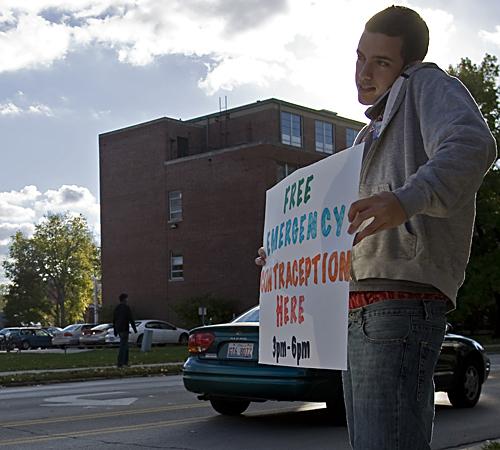Free “morning-after pill” distributed

Dustin Duncan, junior in LAS, talks on his cell phone while advertising free emergency contraceptives at the Illinois Disciples Foundation on Wednesday. Erica Magda
Oct 25, 2007
Last updated on May 12, 2016 at 05:47 p.m.
Champaign County Health Care Consumers and Planned Parenthood sponsored a “Free EC Day” Wednesday and distributed free emergency contraception to women of all ages during the event.
The event advertised that emergency contraception, also known as Plan B or the “morning-after pill,” is a safe and effective form of back-up birth control that can prevent pregnancy not only from unprotected sex, but also contraceptive failure or sexual assault.
According to the McKinley Health Center Web site, Plan B may reduce the risk of pregnancy by 95 percent when taken within the first 24 hours after unprotected intercourse and by 61 percent when taken between 48 and 72 hours after the fact.
Kathie Spegal, director of education and public affairs at Planned Parenthood of East Central Illinois, said medical research indicates that taking Plan B between 72 and 120 hours after unprotected intercourse continues to provide some protection against unwanted pregnancy.
Get The Daily Illini in your inbox!
“We recommend you get it as quickly as possible because there is still a chance that it will stop ovulation,” Spegal said. “It is still effective, just with reduced efficiency.”
Allison Jones, lead organizer for the women’s health task force for CCHCC, said this was the seventh time it has sponsored the event with great success. About 180 packs of emergency contraceptives were distributed yesterday.
Planned Parenthood required each woman to fill out contact information before a licensed physician or nurse practitioner provided one package of emergency contraception.
“I know it sounds a little unusual for someone to give away something for free,” Jones said. “But Planned Parenthood is able to give it out because they believe backing up birth control is the smart thing to do.”
The event advertised that women of any age could get the free emergency contraceptive and no identification was needed, but by law Plan B is only accessible over the counter to women ages 18 and older and only by prescription to women 17 and under, according to information from the Food and Drug Administration.
When the FDA approved over-the-counter access on Aug. 24, 2006, strict rules regarding the distribution of Plan B were set, including that it would be stocked behind the counter by pharmacies so it could not be dispensed without a prescription or proof of age.
“Technically we are giving it out as a prescription; we just aren’t giving them a paper,” Jones said. “We are cutting out the middle man and the physicians are just giving them the drug.”
Planned Parenthood has a volunteer team of physicians and nurse practitioners that volunteer to be present for distribution of the drug. There were three on hand at yesterday’s Free EC Day.
“That’s why women of any age are allowed to get it,” Jones said. “If we were giving it out over the counter, we wouldn’t be giving it to younger women.”
Dr. David Lawrance, medical director at McKinley Health Center, said although he and his medical staff will not be providing a literal prescription, this method of distribution is legitimate.
“It’s a little different than over the counter,” Lawrance said. “But people that are licensed to write a prescription are able to dispense the drug.”
Additional information about emergency contraception was provided to women through manufacturer instructions and a generic information sheet provided by Planned Parenthood volunteers.
Oral information was also provided at the time of distribution.
“We just provide women with an easy way to back up their birth control because we think it’s important for women to prevent pregnancy if they are not ready to have that decision made,” Jones said.
Becky O’Donoghue, women’s health task force volunteer for CCHCC and graduate student, spends much time reading about women’s health and finds the majority of the material depressing.
“You can only read so much about poor or uneducated communities before you say to yourself ‘I must do something,'” O’Donoghue said.
To ensure that people in the community do not remain confused about the emergency contraception, O’Donoghue and others in CCHCC’s women’s health task force hope to raise awareness through events like Wednesday’s event.
“By putting the product into women’s hands, they can keep it in case of emergencies and we are ensuring that they have it as a back up,” O’Donoghue said.





